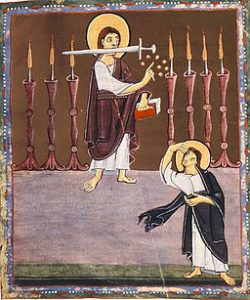 What Is Jezebel’s Sexual Immorality or Harlotry?
What Is Jezebel’s Sexual Immorality or Harlotry?
In Revelation 2:20, Jesus highlights the glaring weakness of the church at Thyatira. Revelation 2:20 says, “But I have against you that you are tolerating the woman Jezebel, who calls herself a prophetess, and she is teaching and deceiving my servants so that they play the harlot and eat food sacrificed to idols.” Of course, Jezebel is not the woman’s actual name, but is due to her typological connection to Queen Jezebel. Queen Jezebel is the well-known foreign wife of King Ahab, who leads him and Israel (the northern kingdom) to worship other gods and their idols, including Baal (1 Kgs. 16:31; 18:4; 21:25). Like the Harlot of Revelation (Rev. 17:6), she kills God’s prophets, because she wants to wipe out the worship of God (1 Kgs. 18:4). In order to interpret Revelation 2:20-22, it is important to notice that Queen Jezebel is nowhere accused of any sins of sexual immorality. Instead, she is directly responsible for leading Israel to “play the harlot” or “commit sexual immorality” in the spiritual or religious sense. In 2 Kings 9:22, Jehu refers to Queen Jezebel’s “harlotries” (or “sexual immoralities”) and her “sorceries.” Her harlotries are her participation in, and encouragement of, the worship of foreign gods and idols; sorcery often goes along with idolatry (Deut. 18:10). Thus, her harlotry is not physical, but spiritual. The same is true for the Jezebel of Thyatira. She is a false prophetess who teaches that Christians can worship Jesus and worship pagan gods, which includes eating the meat of pagan sacrifices. The Old Testament would regard such worship of other gods as “playing the harlot.”1 Thus, Jezebel is a Nicolaitan teacher, whose teaching is as dangerous at Thyatira as the teaching of Balaam was at Pergamum (Rev. 2:14-15). She is “playing the harlot” (porneuō) and encouraging others to do the same.
Breaking the Ten Commandments with Jezebel
The name Jezebel implies that the teaching of Jezebel of Thyatira is a serious threat to the church. Anyone who follows her teaching will be disobeying the first two of the Ten Commandments. Their worship of God will not be pleasing to him, because their compromise has defiled their worship. The contradiction becomes clear later in Revelation. To worship false gods and idols is to worship the Devil and the Beast (Rev. 13:4, 8, 14-17; 9:20). It should be obvious that someone who claims to be a faithful servant of God cannot also serve or worship the Beast. Notice that Jesus accuses Jezebel of “deceiving my servants” (2:20). Elsewhere, Satan, his False Prophet, and Babylon the Harlot are the ones who are deceivers (Rev. 12:9; 13:14; 18:23; 20:3). The charge of deception links Jezebel, the prophetess, to her fellow deceivers. They are the ultimate source of her teaching. It is deception, not truth.
The Judgment of Jezebel and Her Followers
Just as God’s judgment eventually came upon Queen Jezebel (2 Kgs. 9:33-37), the time has come for the judgment of Thyatira’s Jezebel. Jesus says, “And I gave her time so that she might repent, and she does not want to repent of her harlotry. Behold, I am casting her onto a sickbed and those who are committing adultery with her into great tribulation, unless they should repent” (Rev. 2:21-22). It appears that Christ had previously called upon Jezebel to repent. Now her time for judgment is at hand, but those who have accepted her teaching could still repent, according to the end of the verse. A few of Jesus’ terms could use clarification. “Harlotry” appears to be a good translation for porneia in light of the Jezebel typology and 2 Kings 9:22. “Committing adultery with her” does not mean that Jezebel has been engaging in sexual relationships with many in the church. “Her children” are not also her lovers (2:23). Instead, as is sometimes the case in the Old Testament, this is a strong way of saying that men and women in the church are engaging in idolatry along with her. In other words, Jezebel and her followers are all committing spiritual adultery against God when they are worshiping pagan gods. Therefore, the Son of God is casting Jezebel onto a bed, which is probably a place of sickness that leads to death (a “sickbed”). Her followers are about to experience “great tribulation” (2:22), which is the “pestilence” of Revelation 2:23.
Footnote:
- See, for example, Exod. 34:16; Lev. 17:7; 20:5; Deut. 31:16; Ps. 106:36-39. In the LXX, these verses all contain forms of porneuō (usually with a prefix), which is the verb that one finds in Rev. 2:20 and 2:14. Also, see comments on Rev. 17:1. See also Lust, A Greek-English Lexicon of the Septuagint, s.v., porneuō. According to this lexicon, porneuō (translated “play the harlot” above) can mean “to act unfaithfully” or to commit idolatry.
Sources:
These paragraphs are slightly edited portions of my book:
Paul Hoskins, The Book of Revelation: A Theological and Exegetical Commentary, pp. 96-98 (those pages provide further sources and footnotes that I have omitted above).
